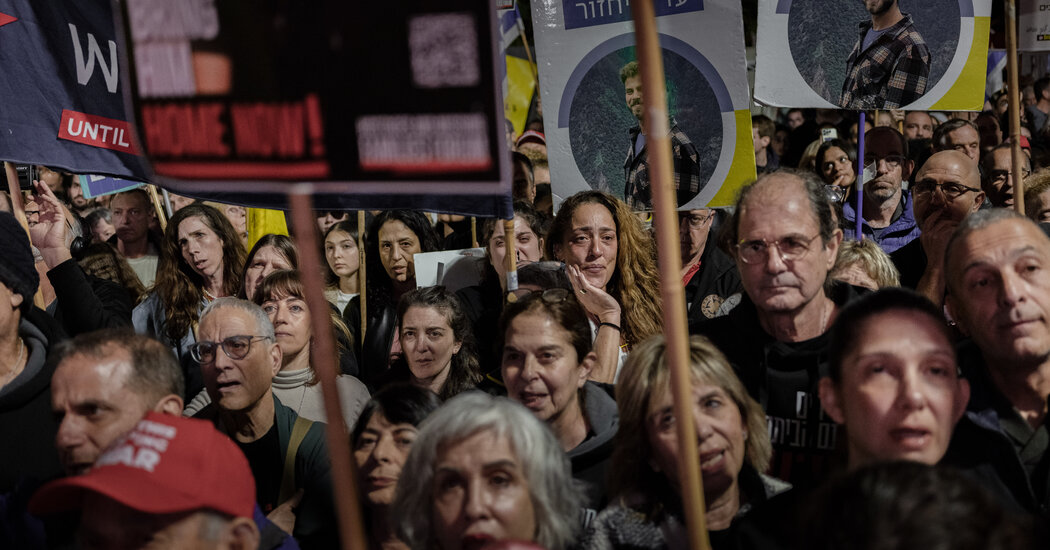Khalil al-Hayya, Hamas’s chief negotiator, said in a speech on Tuesday that militants intended to hand over the remains of four Israeli hostages to Israel on Thursday in exchange for the release of Palestinian prisoners.
Mr. al-Hayya said that members of the Bibas family — some of the best-known hostages worldwide — would be among the four bodies handed over, without saying how many. The three remaining members of the Bibas family in the Gaza Strip are Shiri Bibas and her two children.
The Israeli prime minister’s office confirmed that the bodies of four Israelis would be returned on Thursday, but officials did not respond to requests for comment about whether members of the Bibas family would be among them. The Israeli military had said until recently that there were grave concerns for the lives of Ms. Bibas and her children, though it had not confirmed their deaths.
For many Israelis, the story of the Bibas family has become a symbol of the brutality of the Hamas-led attack of Oct. 7, 2023.
Shiri Bibas was corralled by gunmen and taken to Gaza with her two red-haired children, Ariel, 4, and a baby, Kfir, who was just shy of 9 months old. Yarden Bibas, Shiri’s husband and the children’s father, was also abducted, bleeding heavily after an assailant struck his head with a hammer, relatives said. Mr. Bibas was released from captivity earlier in February.
In a statement, the Bibas family said it had not received official confirmation about the fate of Shiri and her children.
In exchange for the four bodies, Israel will release women and minors detained by Israel in Gaza after the Oct. 7 attack, according to an Israeli and a Hamas official, who spoke on the condition of anonymity to discuss the sensitive arrangement.
Mr. al-Hayya and the Israeli prime minister’s office also said the number of living hostages scheduled to be released on Saturday will be increased to six from three.
Mr. al-Hayya said Avera Mengistu and Hisham al-Sayed, Israeli citizens who have been held in Gaza for roughly a decade, would be among the six. It was not immediately clear why Hamas had decided to increase the number of living hostages to be released. The original agreement had called for Hamas to release three hostages on Saturday in exchange for Palestinian prisoners.
But one Hamas official, Mahmoud Mardawi, said in a text message that Hamas had received assurances from mediators that Israel would allow for the entry of temporary housing units and heavy machinery into Gaza before Saturday. Israeli officials did not immediately respond to a request for comment about Mr. Mardawi’s message.
On Tuesday, Israel delivered two bulldozers to Gaza after Mr. al-Hayya’s speech, said Salama Maroof, the head of the Hamas-run government media office. At least 60,000 prefabricated housing units should be delivered to Gaza during the first phase of the deal, in addition to equipment for rubble clearance, according to a copy of the agreement’s text seen by The New York Times.
Hamas has said that the homes would provide shelter for Palestinians whose homes were destroyed and that the machinery will help make it possible to retrieve bodies from the rubble.
A hostage release would indicate that implementation of the initial, six-week cease-fire agreement between Israel and Hamas is progressing, despite concerns about its fragility.
Negotiations over the second phase of the deal, which calls for a permanent end to the fighting, a full Israeli withdrawal from Gaza and the release of more hostages and prisoners, appear less solid. The two sides were to start talks over details on the next phase two weeks ago, but Qatar, a key mediating country, said the talks had yet to begin.
Hamas has accused Israel of delaying the start of the phase two discussions, while Israel still hasn’t announced publicly when it would send officials to participate in them.
As part of the first phase of the deal, Hamas is supposed to release 33 Israeli hostages, including eight who the Israeli authorities believe are dead. As of Tuesday, Hamas had freed 19 Israelis.
Shaban al-Sayed, whose son Hisham is one of the hostages set for release on Saturday, said his family was awaiting his return with deep anxiety over his condition.
Hisham crossed into Gaza in 2015, which his father said was a consequence of mental illness. Hamas has held him ever since “as a bargaining chip,” said Mr. al-Sayed, a member of Israel’s Arab Bedouin minority.
“We don’t know in what condition he’ll return,” he said. “We’re waiting for him — and when we see him, we’ll know how much we have to celebrate.”
Aaron Boxerman contributed reporting to this article.
